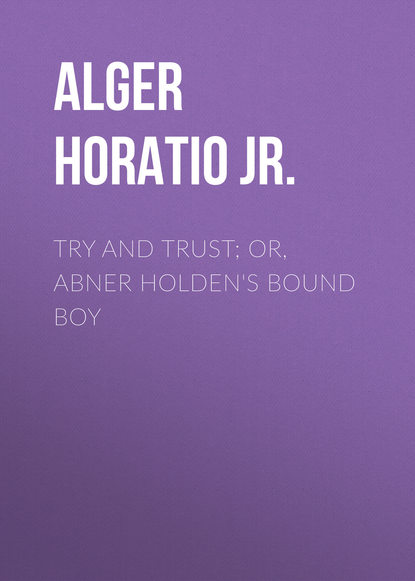По всем вопросам обращайтесь на: info@litportal.ru
(©) 2003-2025.
✖
Try and Trust; Or, Abner Holden's Bound Boy
Настройки чтения
Размер шрифта
Высота строк
Поля
“Yes, get me something as quick as possible.”
“Have you seen anything of Herbert?” asked the housekeeper.
“No,” snapped Abner.
This was a falsehood, of course, but he felt rather ashamed to confess that he had seen Herbert, and that the latter had got the better of him. Mrs. Bickford perceived that he was out of humor, and did not press the question. She concluded that he was angry because his quest had been unsuccessful.
CHAPTER XVI
JUST TOO LATE
Leaving Abner Holden bound in his cabin, Ralph led Herbert, by a short path, out of the woods.
“Your best course,” he said, “will be to take the cars for Columbus at Vernon. At Columbus you will go to Wheeling, and from there, over the Baltimore & Ohio Railroad to Baltimore, and thence to New York. But all this will cost money.”
“I have money,” said Herbert.
“How much?”
“About fifteen dollars.”
“Is that all?”
“Is it not enough to carry me to New York?”
“Hardly. Besides, when you get there, how will you get along? Have you any relations in the city?”
“Yes, an uncle.”
“Then you will go to him?”
“No,” said Herbert, hastily.
“Why not?”
“He does not care to see me. Shall I tell you what sort of a letter he wrote to Dr. Kent about me?”
“Yes, tell me.”
Herbert, in indignant language, which correctly represented his feelings, gave the substance of the letter, which is already known to us.
“I shall not feel easy,” he said, “until I am able to return the ten dollars which my uncle sent me. I am not willing to remain under obligations to one who cares so little for me.”
“I think you are proud,” said Ralph, bending his eyes upon the lad’s glowing countenance.
“Perhaps I am,” said Herbert; “but is it not a proper pride?”
“I cannot say no,” answered Ralph; “but would you feel the same about incurring obligations to a friend?”
“No,” said Herbert; “that would be different.”
“I am glad to hear you say so, for I am going to ask you to accept help from me.”
To Herbert’s surprise, Ralph drew out a small bag, originally intended for shot, and drew therefrom five golden coins, of five dollars each.
“Take them,” he said, simply.
Herbert hesitated, while his face indicated extreme surprise.
“I thought—” he commenced, and then paused.
“You thought me poor,” said Ralph, finishing the sentence for him. “Is it not so?”
“Yes,” said Herbert.
“Most people think so,” said Ralph. “But it was not poverty that drove me from the busy world to this solitude. Rich or poor, I had money enough for my wants. Here I have little use for money. To me it is a useless and valueless thing. You need have no hesitation in taking this. But on second thoughts, I had better give you more.” And he was about to draw forth more.
“No, no,” said Herbert, hastily. “It is quite sufficient. You are very, very kind. Some time I hope to repay you.”
“No,” said Ralph. “Do not talk of repayment. Let me have the pleasure of giving you this small sum.”
“How kind you are,” said Herbert, impulsively, “and to a stranger.”
“Yet my obligation to you is greater than yours to me,” said Ralph.
“How can that be?” asked the boy, raising his eyes to Ralph’s grave face.
“You are the first human being in whose society I have taken pleasure for years. Deeply injured by man, I conceived a hatred for the whole race. But in your frank face I see much to like. I think I could trust you.”
“I hope so,” said Herbert.
“You have inspired in me a new feeling, for which I cannot account. Yesterday the world had no attractions for me. To-day I feel an interest in your welfare, at least.”
“Why do you bury yourself in this lonely place?” said Herbert. “You cannot be happy in it. Come with me to New York. It must be a beautiful place.”
Ralph smiled gravely.
“To the young the world seems bright,” he said. “It is after years have swept away one illusion after another, after faith in one’s fellowmen has been sorely tried, and the hollowness of the world’s friendship has been proved, that the brightness fades.”
“You have seen more of life than I,” said Herbert, “and perhaps it is presumption in me to question what you say; but I cannot help feeling that you are mistaken. I am sure that there is such a thing as true friendship.”
“How many true friends are you blessed with?” asked Ralph, a little sarcasm in his tone.
“Not many, perhaps, but some. There is good Dr. Kent and his family. I am sure of their friendship. Then,” he added, his color slightly rising, “I think I have found another friend,” and he looked in the face of his guide.
The grave face softened.
“Thank you, my lad,” said Ralph. “You are right there, at least. You can rely upon my friendship being sincere.”











